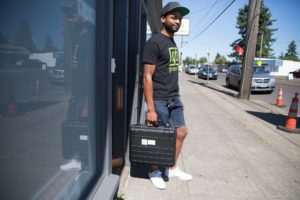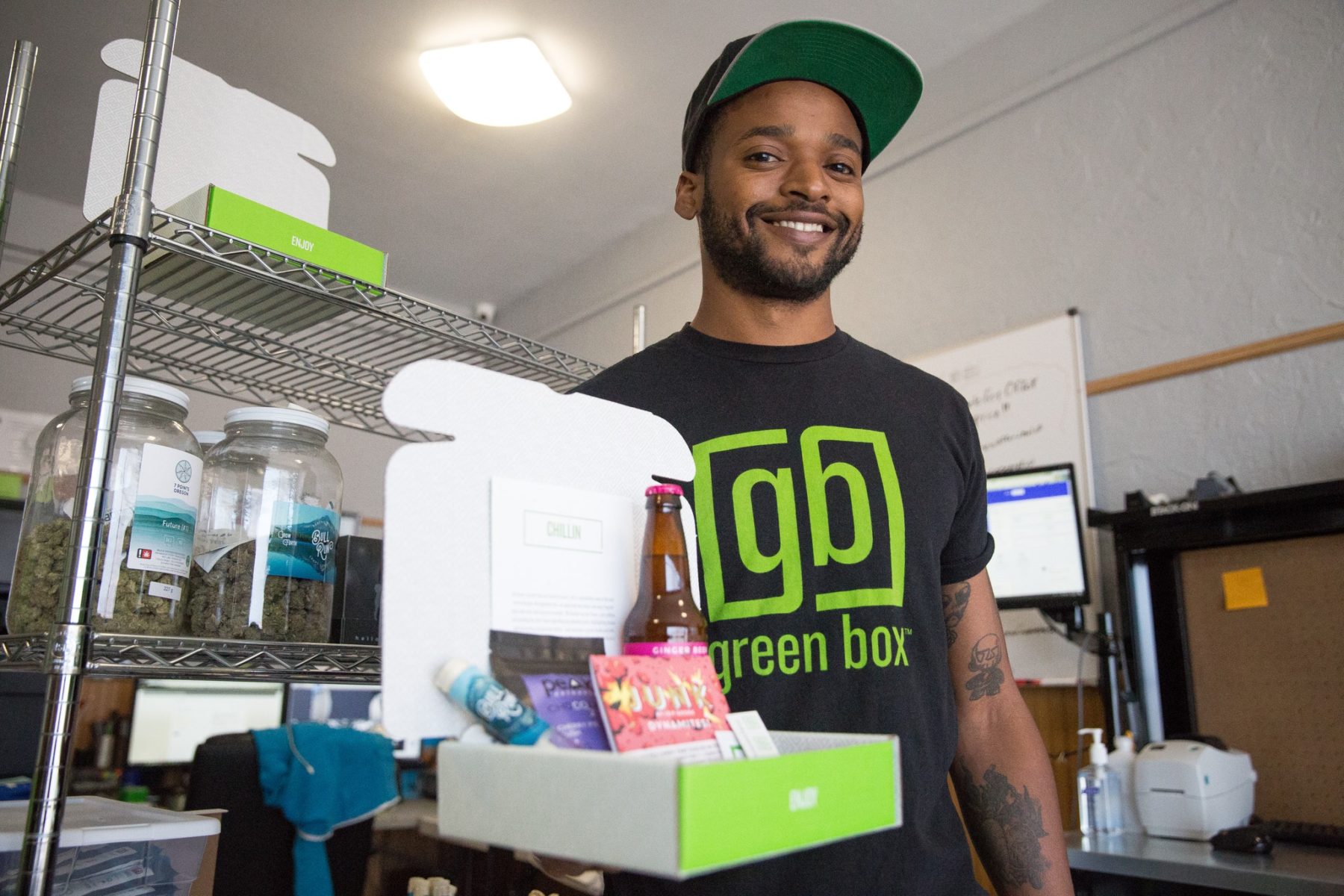Small cannabis business-owners of color in Portland, Oregon are getting a serious leg-up in the legal industry at a time when many of their peers around the country are struggling. While many US jurisdictions, such as Los Angeles, have not adequately delivered on racial justice provisions of legalization—or else failed to include such provisions at all—this represents an inspiring example of legalization’s transformative potential.
In Portland, the NuLeaf Project, a nonprofit organization, made business grants to two black-owned small cannabis businesses earlier this year. It plans to assist many more businesses with future grants. These grants are funded in part by municipal cannabis sales tax revenues: $150,000 out of these revenues has been allocated directly to NuLeaf by the city of Portland.
The first two grants, of $30,000 each, were awarded to Green Box, a personalized subscription delivery service, and Green Hop, a hip-hop themed dispensary.
To receive NuLeaf grants, businesses must be at least 51 percent owned by people of color, and must be incorporated in Portland. They have to show measurable return on investment and a detailed project, and can apply for the grant more than once.
Portland’s cannabis equity program is similar in spirit to those in cities like San Francisco and Oakland, which aim to provide financial and technical assistance to applicants from communities with high levels of poverty or a history of drug arrests (exact criteria vary). Assistance in these places may take the form of business loans, workforce development or priority in business licensing, for example.
But Portland created a very different mechanism.
How Portland Lowers Barriers
In November 2016, the city voted by popular ballot to charge a 3 percent tax on recreational cannabis sales. The revenue was to be earmarked for three purposes: public safety, drug rehabilitation and treatment, and reinvestment in the city’s communities most harmed by cannabis arrests and convictions.
Portland is currently accepting grant applications for non-cannabis community and business reinvestment projects, with about $490,000 allocated from the cannabis sales tax revenues.
An additional $210,000 is set aside for cannabis business owners. They do not receive this money directly from Portland; instead, the city funds grant-making programs—of which NuLeaf is the first— which then allocate funds to qualified applicants.
The NuLeaf Project was launched by Jeanette Ward Horton in July 2018. Its explicit mission is to invest in and support cannabis business-owners of color. According to the Marijuana Business Daily, over 80 percent of US cannabis business owners are white, while just 4 percent are African American.
“I formed this nonprofit to receive the funds and make sure the money went to people of color and African Americans who were disproportionately arrested for cannabis crimes,” Ward Horton told Filter. “I wanted to ensure there was equity in business funding for people of color, that we were informing and encouraging them to apply for the grant, and that we were distributing funds without a biased lens.”
Lack of liquid capital provisions “creates a good environment for fair competition if you don’t have connections and capital.”
Besides its grant program, NuLeaf provides education, mentorship and networking services targeted towards increasing industry participation for people of color. Its work is also partially funded by corporate and private sponsors.
Ward Horton explained that Portland has no cap or limit on how many cannabis businesses can be licensed, unlike some other cities. It also has lower license application fees and liquid capital requirements.
Liquid capital provisions require a business seeking a license to prove it has a minimum amount of funding up-front; one justification used for this is that many banks do not issue loans to cannabis businesses. In Missouri, for example, a start-up medical marijuana cultivator must have at least $500,000 in liquid capital; a retailer must have at least $300,000.
The lack of such requirements in Portland “creates a good environment for fair competition if you don’t have connections and capital,” Ward Horton said. “The city has already lowered barriers to getting licensed, and this grant addresses the other equity gap for women- and minority-owned businesses, which is capital.”
The Benefits for a Small Business Owner
Filter spoke with Adrian Wayman, the founder of Green Box and one of the first recipients of a NuLeaf Project grant. His company curates packages of cannabis, CBD and hemp products and sends them to subscribers for a monthly fee.
Wayman (pictured top and below) started the company in 2015, but at the time cannabis delivery businesses were still illegal in Portland. He helped lobby the city and state to create a new delivery license category, which he received in 2017.

“We’re completely family-owned, funded and operated, and had not received any outside funding until this grant,” said Wayman, who found out about Ward Horton’s initiative online. “This was a huge benefit for us. Previously I was totally financed on debt and my own life savings.”
He immediately applied for the grant and then found himself giving a presentation about his business in front of a small panel. “I just treated it like Shark Tank,” he laughed.
In the end, Wayman’s pitch won over the NuLeaf staff and his business was selected to receive $30,000 as a one-time, non-repayable sum. Because of this, “I’ve been able to hire someone else—which means we doubled our team!” he said. “I’m no longer doing everything by myself. We’ve made improvements to the website and product selection, and cut costs on packaging. Our business has doubled and almost tripled since we received the grant in January.”
“I was arrested for cannabis possession, and that was always held over my head with employment and housing. So the city did exactly what they should have done to fix the wrong.”
The grant to Wayman’s company was particularly fitting given his past victimization by cannabis prohibition.
“I was arrested for cannabis possession, and that was always held over my head with employment and housing,” he said. “So the city did exactly what they should have done to fix the wrong for something that should have never been a crime, and invested in my business. This is simply part of restoring the wrongs by giving me the opportunity to make a living, feed my family and have a successful business.”
So Far, So Good—But It’s Only a Start
Rodney Holcombe, a Drug Policy Alliance staff attorney, praised Portland’s model for reinvesting cannabis sales tax revenues into the business owners most in need of assistance. “Many non-profit organizations have a closer connection than local governments with the people that would benefit from such a grant,” he said. “Partnering with a non-profit with a demonstrated history of working with impacted communities is a great way to facilitate this process.”
But Holcombe noted that Portland does not provide continued support in the form of licensing fee waivers or technical or regulatory compliance assistance that other cities offer. Many businesses struggle to get through a complicated and expensive licensing process, or complying with packaging, safety or other legal requirements after being licensed.
“I think the city should allow grant recipients and prospective recipients to offer feedback and raise any concerns about the program or organizations like NuLeaf,” Holcombe told Filter. “There should be some mechanism to create oversight and allow folks to hold these organizations accountable, should there be an issue.”
“We want to see this money get distributed more evenly.”
Ward Horton also cautioned that Portland and the state of Oregon have much more work to do to achieve real social justice. A recent audit of the city’s finances showed that of the $8.2 million raised since 2017 through the voter-mandated cannabis sales tax, 80 percent went to the city’s transportation and police departments. The remaining $1.2 million was reserved for equity grants and record-clearing programs.
“This is now what the voters intended,” Ward Horton said. “We want to see this money get distributed more evenly. Especially when police abuse of authority and arrests in communities of color is what we were trying to address.” She also explained that there is no statewide social equity program in Oregon, and urged the state legislature to implement one.
Oregon is also lagging behind on expunging cannabis criminal records. Ward Horton noted that though the state allows for expungement of certain convictions, the process is complex. Only people who can afford to pay certain fees and fines can successfully expunge those prior convictions—though proposed legislation aims to fix this.
Small businesses like Green Box are still operating in a very difficult industry, said Wayman, and can only survive through strong word-of-mouth promotion, being connected within the community and industry, and by getting involved in lobbying.
The city’s equity grant program is laudable. But it is only a starting point in addressing the many structural disadvantages faced by cannabis business owners like Wayman.
Photos by Intisar Abioto / Mercatus PDX via Green Box





Show Comments